This time it was different – in cooperation with https://wrkland.com/ it was our first in-premise event! The live stream can be found on the LinkedIn.
We had 3 amazing speakers:
- Viktor Vedmich, from Amazon Web Services – “Karpenter: Efficient scaling of Kubernetes clusters”
- Rashmi Ankesh Joshi, Uldis‘ public speaking mentee from Accenture Baltics – “Why Indians blame mothers?”
- Gundega Dekena from Accenture Baltics – “The search for missing milliseconds: Kubernetes story”
What was different this time? That we had a DevOps Journalist! Here are a few interviews from the event:
Interview with Anton
What’s your name? What do you do? Where do you come from?
Yeah, so my name is Anton Muzickin. Currently, I’m working in Accenture as DevOps for almost five years.
Why did you come to this event?
So my colleagues shared information that there will be such event that also my company is organizing. So I just thought it would be nice to visit this. I have visited before online this event and it was really nice so decided to come to it in person.
How many events have you visited so far?
I don’t remember the exact number, I have visited some of them. I don’t know… at least four or five.
You are a regular participant I hear! How do you like it so far? How was Victor?
Victor was really nice. Unfortunately, I miss the beginning, but it was really a great well-put-together presentation. I liked the visualizations that he used and I didn’t know that such a tool existed. I liked to hear about the carpenter. Actually, currently in the project, I have been asked to integrate the Karpenter so it was very relevant information for me.
Interview with Aleksej
What’s your name? What do you do? Where do come from?
My name is Aleksej Larkov. I was working for six months in some company, now I just changed the contract.
Is it a secret who you contract for?
Different companies. Sometimes it’s a short-term project sometimes long-term.
How did you end up here?
Being at home all the time is quite boring. I don’t see many people except my family. Here is a good opportunity to come across people.
What are you expecting next from the event?
I don’t really know, I didn’t check. I just came to watch anything. It’s just too boring to watch online, online all the time. I didn’t expect here to find a lot of new knowledge or something like that, but the first speech was actually quite useful. I very often need to solve that kind of problem – how to schedule pods in and out. This was definitely very useful for me at least.
Okay, thank you! There are also some snacks, you already know that I assume. See you later. Thank you.
Thank you.
Interview with Rizwan
So what’s your name? Where do you come from? Where do you work?
My name is Rizwan Ghzzaal, and I come from Pakistan. I work at Accenture. And the man who was interviewing me, who took my interview, is now standing in front of me. I was very inspired that day! And today I’m standing in front of him. So it’s, it’s, you know, it’s something that, you know, a dream come true.
Oh, thank you so much! So… you came to this event, already saw this and that. Is that similar to how you were doing events in Pakistan?
We also had one AWS Developer Advocate coming to Pakistan and there we had a machine learning demo. But the DevOps Talk here, the crowd is more than back home because DevOps here… there are more contributors here. The community is strong, but back in Pakistan, it’s evolving. It is still getting the essence that what DevOps is and how to work with the DevOps culture. They are just in the phase of transitioning, they are destroying the silos and then working and collaborating. So this is a huge difference for me.
Yeah, well, thank you for that. We had put a lot of work into the community in Latvia, but also in this event specifically. Thank you for your nice words!
And thank you! I really appreciate it and I look forward to… you know… even do some contribution on my end to the community, because I’m very much happy to guide and share my experiences that how I came to DevOps, and how I can help you transition into DevOps. This is how I can give back to the community as a community. I can give a talk or something.
Indeed! And we actually can even help you to prepare a little if you want to. But I believe you are a good talker as you are! Anyhow, we can even do some dry runs and stuff like that if you want to. So yeah, let’s continue discussing that offline. It was nice meeting you!
Same here. Thank you!
Interview with Viaceslav
What’s your name? What do you do? Where do you come from?
My name is Vjaceslavs Lukasevics. I’m professional test engineer currently working in Printify doing some testing. For the last five years I was heavily involved in some Continuous Integration, Continuous Delivery. So I’m trying to do the things I have learned for testing.
Okay, so this is very interesting. so you’re a QA, who at the same time has spent a lot of time on CI/CD, so a very technical QA. How did it happen that you still choose the QA path? I assume that you are kind of mixing together all this knowledge, right?
Yes, there are not a lot such technical QAs especially. I think I know every each of them in the LV. This for sure is some niche.
Okay, so have you seen anyone testing the pipelines? The pipeline should test stuff but have you ever seen a case where there’s actually someone writing a framework, test cases for the pipeline’s themselves?
I actually have been doing that as well. I was creating some unit tests for Jenkins libraries, creating GitHub actions, had some pipelines that tested this GitHub actions themselves. And again, same logic can be applied to everything.
Okay, I’m happy to hear that someone’s doing that. So it’s a super old topic, but still nowadays, a relevant one. What do you think about BDD? Have you seen it a real life actually working? Like as per book?
As per book, I haven’t seen it. In a working environment I have seen a case that succeeded for multiple teams – there was a need for alignment, how’s the specification was written, the test cases written. So, the BDD tests like a DSL were used to reach an agreement.
But how do you put that in the pipeline? Because the whole idea that that’s only green once you have implemented it, and then the build is red all the time.
It was done there. Basically, the test always follows the code. It’s not like they were created in advance. It was created all together, like in TDD but the same BDD.
Thank you for the talk.
Interview with Ankit
Where do you come from? What’s your name and why did you come?
My name is Ankit Nigam. I’m a Solutions Architect at AWS. I’m based out of Finland. I’m here to be part of the community in the Baltic area, specifically Latvia. And because we have been working very closely with a lot of Baltic and Nordic customers, but we haven’t been involved in the community because of the pandemic. So we thought that is kind of is a perfect opportunity to come and join the community and learn and share ideas and network around.
Yeah, that’s great. How do we let we look on your AWS map like how how big are we? Well, there should be different dimensions, right?
Yeah, exactly. I mean, without commenting specifically on like sizes but we do have a lot of customers in the in the area. And we actually looking to expand our team presence also in the Baltic area. So specifically, and to be honest, we are looking for solution architects who are properly proficient in the local language. So we are looking for Latvian, Estonian and Lithuanian speaking professionals who can join us and our teams so that we can serve our customers even better.
In this multi-lingual international one world there’s still the problem that someone needs to go to that end customer who is probably non technical, and talk the local language.
We’re also seeing exactly the same. Some of the business conversations actually happen in the local language and it might be even easier to even get the first technical engagements also in the native language. We speak the language of our customers. We are very customer obsessed company.
Alright, we need to run! The talk is starting.
Interview with Viktor
Who you are, what you did and why you did it? And where do you come from?
Of course, my name is Victor Vedmich. I am develop advocate of AWS. My previous role was related mostly to DevOps. I worked as system architect, as DevOps engineer and system administrator. Today, here I presented about Karpenter, the new approach how you can scale Kubernetes cluster. I highly recommend to look at this and you will understand how classic scaling may look like from another point of view. I mean, for example, in the current situation there is only Cluster Autoscaler, but Karpenter can provide you another way to scale and work with your load in Kubernetes.
I work in Germany Munich office, and honestly, I’m very glad to just be here. So warm audience. So many questions! Like, I don’t remember when I was tired to answer to the questions. Yeah, thank you very much.
It took a while indeed. So what else do you do? You travel a lot and speak at such type of events. But then when you’re at home or when you’re not traveling? Do you have a private life?
(laughs) Yeah, I have a private life and I really like to travel. Because, like it’s one of my not like responsibility, but a way how I can realize myself in the current position. It doesn’t mean I only speak about AWS. I prefer to say I speak about technology. Not only Kubernetes but many other technologies as well. About my private life. Mostly I would like to spend my weekend outside of the home hiking, for that reason I really love Munich. Location of Munich is super great. You can travel to Italy or Austria to mountains, hike to different locations. Like every week I try to find some new places.
So are you saying are more like what’s your secret to the work life balance?
Honestly, no secret, I believe we all must have the balance. I like work but you also have to spend some time for learning also. For your career in IT if you want to advance, you need to spend like 10-20% of your time to learn something new. What am I doing to relax? Honestly, yeah… For me, what works to balance… On weekends try to avoid to turn on my laptop. Leave my home. Okay. Especially during vacation just turn off laptop, don’t read any work in chats, no communication, no emails, no systems.
So I heard you you will be somewhere in Poland soon. What’s that about?
Yeah, in two weeks, I will be in Poland, in Warsaw. And not only two weeks. I also volunteered in October. On that presentation I am going to speak about CI/CD. How looks like ideal CI/CD pipeline. I understand we already spoke about CI/CD a lot of times. But what I see from project to project is that we don’t have some blueprint. I mean, like from what to start, where to go, don’t know what to do. We need some tests. What kind of tests? Do we need some quality gates? What essential to include in CI? Some system engineers, DevOps engineer misunderstand even what is CI. And how should it look like? What is Continuous Delivery, Continuous Deployment? This presentation will not have a demo but itss high level overview looks like a blueprint of high level CI/CD. I believe that it will be a very good start for any projects, just like look as a blueprint to cover what you need in your project.
Okay, clear, well see you there. Okay, thank you.
Interview with Katya
We have another guest. What are you doing here? Why did you come?
My name is Kasia Shkor and I’m a community manager for DevOps engineers and system architects and this is a part of my job and sphere of interest. I visit events and see what are people talking about. Moreover, one of the speakers here is going to be my guest on the event that I’m working for.
Why are you doing this? well, why you could be just sitting at home having tea and enjoying some live video, and saying that this was the best thing ever.
Actually, you’re saying like it’s a bad thing (laugh). Why am I doing this and why I participate myself is… nowadays I see that relationships between people are the most precious thing. And here on such events actually what we do is we build the relationships, we become friends, so we share knowledge we’re building good relations. In this situation in the world I think this is really important.
Talking about the DevOps – it’s a new black. Everybody’s talking about that. Moreover, some people are saying that DevOps is not a separate job, but it should be a culture. So, this is also interesting, and that’s why I came and, moreover, I really like and I have to say thank you! Apart from topics, you invited a cultural, even a feminist speaker. I see such thing absolutely for the first time in my life. Really, I never saw such things. Neither at conferences nor here, thank you for that!
Okay, yeah, it was quite quite a kind of an experiment to do. I hope that there’s more people who enjoyed that.
I really liked it. In the engineering community, we’re speaking not only about how to use Kubernetes correctly without downtimes. Here we’re discussing what’s happening in our lives and what’s important. And I believe I would love to hear more. Yeah.
We’ll keep that comming like every once per quarter or so I believe. Okay. Thanks. Thank you for the talk and see you in Warsav in two weeks.
Thank you!
Interview with Kristaps
So who are you? What’s your name? What do you do now?
My name is Kristaps Gutans and I am AWS solutions architect in a consulting firm.
Is it a secret what consulting firm?
No of course! It’s Arvato Systems Latvia.
Okay, and what do you do as AWS solutions architect?
Well, currently I’m doing a lot of TerraForm (laughs). To be more precise, we are selling like sets of Terraform modules that deploy AWS organizations and AWS landing zones, managing accounts, security, governance, logging, that type of stuff. Selling it to clients.
Okay, cool. So, what, what brings you here?
This is not my first time to attend the DevOps events. So it seemed interesting and also I was very curious to listen to how Gundega speaks.
What could be one thing you would suggest to the people who didn’t come today?
Well, there’s free snacks fear beer, a free beer, and very interesting topics. Even if you’re not even aware of DevOps, probably you still can learn a thing or two. So it’s fun.
Okay, thank you for the Talk.
————————————————–
Thank you for reading! The next event most probably will be on the 25th of October, 2022. Reserve the date and follow us on meetup.com




[…] it seems like only yesterday we had our first in-person meetup in a really, really long time, with about 70 participants and 3 excellent speakers. There ware a […]